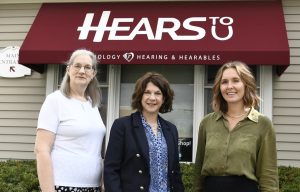Are you or a loved one struggling to hear the world around you? Navigating the journey to better hearing can feel overwhelming, but finding the right audiologist can make all the difference. With the right guidance, you can unlock the sounds that enrich everyday life.
Understanding how to locate a qualified audiologist in your area is essential, as factors such as location, credentials, and specialties are crucial in your decision-making process. Hearing health plays a significant role in overall well-being. Knowing what services, like hearing screenings and balance assessments, are available can empower you to take the next step.
In this article, we will explore the vital components of finding the right audiologist for your unique needs. From considerations to ask during your search to tips for understanding insurance coverage. Together, let’s embrace the journey toward improved hearing and a more vibrant life.
Factors to Consider When Searching for an Audiologist
Finding the right audiologist can significantly improve your quality of life if you or someone you love is experiencing hearing loss, balance disorders, or sensitivity to sounds. As a cornerstone of your hearing health journey, the decision to choose a hearing care professional goes beyond just locating the nearest clinic. It involves a thoughtful consideration of several vital factors that assure the quality of care you receive is top-notch, and the healthcare providers you rely on meet your specific hearing needs.
Location
The convenience of location is paramount when searching for an audiologist “near me.” By entering your zip code in a search tool or on a hearing center’s website, you can find a qualified hearing specialist within a comfortable traveling distance from your home or workplace. An accessible location not only makes it easier for initial visits but also becomes invaluable for follow-up appointments, hearing aid fittings, or when immediate care is needed for issues such as ear infections or urgent adjustments to hearing instruments.
Credentials and Qualifications
When it comes to your hearing health, ensuring that the professional you choose has the proper credentials and qualifications is essential. Look for experienced audiologists who are licensed in audiology and are members of reputable associations like the American Speech-Language-Hearing Association. Their qualifications often extend beyond state licensure to include certifications that highlight their expertise in areas such as cochlear implants or balance disorders.
Specialties and Services Offered
Audiology encompasses more than just hearing aids. It’s important to understand the wide range of services and specialties offered by the audiologist. Some centers may focus on comprehensive hearing evaluations and hearing aid fitting. However others provide in-depth care for balance disorders or specialize in the treatment of pediatric ear infections. Consider whether the audiologist offers state-of-the-art technology like sound booths for accurate hearing assessment or personalized hearing aid options to best fit your lifestyle.
Patient Reviews and Testimonials
Gleaning insights from others’ experiences can guide you toward finding a hearing specialist who has demonstrated quality care through positive patient outcomes. Take the time to read reviews and testimonials. These often reflect the level of personal care and attention each person visits. These candid insights can offer a glimpse into how each audiologist addresses individual hearing abilities and how they prioritize the overall patient experience. Indicating their professionalism and compassion in providing hearing healthcare.
When you approach your search with these factors in mind, you embark on a path that leads not only to exceptional hearing assistance but also to a partnership with a hearing care professional who can genuinely enhance your day-to-day well-being. Choosing the right audiologist is a crucial step in addressing hearing loss and ensuring the sounds of life are as rich and clear as they are meant to be.
Notable Audiologists
Appreciating the expertise and dedication of audiologists is essential to recognizing the significant role they play in the healthcare industry. Particularly for those experiencing hearing and balance disorders. These hearing specialists bring expertise and compassion to their practice. Committing to a wide range of hearing health services, from comprehensive hearing evaluations to intricate cochlear implant procedures. It’s a genuine comfort to know that when you seek out a ‘licensed audiologist near me,’ you’re not just looking for a healthcare provider – you’re searching for someone who is keenly focused on improving your overall quality of life.
Let’s take a moment to appreciate an audiologist who stands out for their exceptional contributions to hearing care and their unwavering commitment to their patients’ well-being.
Kim Fishman
Kim Fishman is a remarkable figure in the world of audiology, renowned for her extensive experience and commitment to quality care. As an audiologist, she offers a comprehensive approach to hearing health that includes a thorough hearing assessment, personalized hearing aid fitting, and diligent follow-up care. Kim’s compassionate nature and keen sensitivity to sounds allow her to tailor her services to each person’s unique hearing abilities. Therefore ensuring that her patients receive the most beneficial treatment for their individual needs.
Patients have expressed deep gratitude for the quality of care Kim provides, accentuating how she has positively altered their lives. Those who have had the pleasure of her services laud her for her remarkable blend of professionalism and personable demeanor. Making visits to her hearing center an assuring and constructive experience. Under her expert guidance, many have found that even untreated hearing loss or persistent balance disorders can be effectively managed. Accordingly leading to improved daily function and social interactions.
Kim’s dedication to hearing health doesn’t cease with the end of an appointment. She remains a proactive advocate for continued patient education. Aligning with the standards and practices recommended by the American Speech-Language-Hearing Association. By integrating state-of-the-art technology and evidence-based practices, Kim Fishman exemplifies the epitome of an experienced audiologist who prioritizes the betterment of her patients’ lives with every hearing exam and instrument fitting.
Her exceptional skills and profound impact on her patients highlight the importance of seeking out experienced audiologists who are not just healthcare providers but also champions for enhancing the quality of life for those with hearing challenges.
When to See an Audiologist
When experiencing symptoms such as persistent hearing loss, tinnitus, or balance issues, it may be time to see an audiologist. An audiologist is a hearing care professional specializing in diagnosing and treating hearing and balance disorders. If you struggle to follow conversations, frequently ask others to repeat themselves, or need the television volume louder than others prefer, a comprehensive hearing evaluation is recommended. Furthermore, individuals who experience sensitivity to sounds or have a history of ear infections should consider scheduling a hearing assessment. Audiologists can also assist with hearing aid fittings and provide information on cochlear implants for those with significant hearing loss.
Key indicators that necessitate a visit to an audiologist include:
- Difficulty understanding speech
- Exposure to loud noises or occupational noise
- Ringing or buzzing in the ears (tinnitus)
- Issues with balance or dizziness
- Family history of hearing loss
- Ear pain or ear-related health concerns
Early intervention by a licensed audiologist can improve your quality of life significantly. Remember to choose healthcare providers affiliated with establishments like the American Speech-Language-Hearing Association for quality care.
Services Typically Offered by Audiologists
As we journey through life, our ears are the gatekeepers of sound and communication, playing a crucial role in how we interact with the world. Audiologists, dedicated hearing care professionals, offer a broad spectrum of services that extend well beyond just diagnosing hearing loss. Their meticulous work is intertwined with ensuring our hearing health, which unequivocally affects our overall quality of life. These licensed audiologists come equipped with the expertise to perform comprehensive hearing evaluations. These evaluations are crucial for pinpointing the nuances of our hearing abilities. Their role as healthcare providers is vital in sustaining not just your hearing but also your balance. Making a profound impact on your daily functioning and well-being.
Hearing Screenings
Hearing screenings are the first step on the path to auditory clarity – a simple yet crucial evaluation that can often be the turning point towards improved communication and engagement. This quick procedure, typically conducted in a sound booth, is designed to identify potential hearing issues. Therefore guiding your next steps towards detailed assessments or interventions. Usually, hearing screenings are provided at schools, health fairs, or even within the inviting walls of a local hearing center. Making them accessible based on one’s zip code and convenience.
Hearing Aid Evaluations
When it’s determined that a hearing aid could benefit a person’s hearing health, an audiologist conducts a meticulous hearing aid evaluation. This critical consultation assesses a person’s hearing loss severity and lifestyle requirements to ensure the best hearing aid fit. As instrument specialists, audiologists offer aid fitting and tuning to ensure that each person visits the world of sounds equipped with the right auditory assistance. The range of hearing aids is vast, and audiologists navigate this terrain expertly, matching technology to individual needs.
Balance Assessments
Balance is an integral part of our daily life, and disturbances can be debilitating. Audiologists offer balance assessments using state-of-the-art equipment and techniques to diagnose balance disorders. These evaluations may include tests such as the Videonystagmography (VNG) or Electronystagmography (ENG), which study eye movements to assess the inner ear and balance functions. A balance assessment can illuminate the root causes of dizziness and guide appropriate treatment.
Telehealth Options
Embracing modernity, many audiologists now extend their services beyond the traditional office setting through telehealth options. These services offer greater flexibility, ensuring quality care without geographical barriers. Telehealth options might include virtual consultations, remote hearing assessments, and digital follow-up visits for hearing aid fittings. Virtual care becomes a sanctuary for busy individuals, those with limited mobility, or simply for anyone appreciating the fusion of healthcare and technological convenience.
By investing in the expertise of experienced audiologists and utilizing a wide range of services available, individuals can tackle the challenges of hearing loss and balance disorders head-on. Ensuring their quality of life remains harmonious with their ambitions and joys.
Assessing Your Lifestyle and Needs
When embarking on the journey to improve your hearing health, assessing your lifestyle and needs is a pivotal first step. Each person’s hearing journey is unique, and understanding your daily environments and activities helps in tailoring the perfect hearing care plan.
Consider the following aspects:
- Communication Needs: Do you often find yourself in group conversations, attend social gatherings, or require attentive listening for work?
- Listening Environments: Are you frequently in noisy places, or do you need to hear well in more tranquil settings?
- Physical Activity: Does your routine include physical activities or sports where your hearing aid must remain secure?
- Technology Use: Are you comfortable with advanced technology, and will you benefit from hearing aids with connectivity options for phones or TVs?
- Cosmetic Preferences: Do you have a preference for the visibility or style of hearing aids?
The goal of these considerations is to ensure the quality of life is not compromised by hearing loss. A hearing care professional can conduct a comprehensive hearing evaluation to understand your hearing abilities and suggest solutions, ranging from hearing aids to cochlear implants, based on your individual needs. A thorough assessment guarantees that you receive quality care tailored to enhance your hearing health.
Key Questions to Ask Potential Audiologists
When seeking out a licensed audiologist in your quest for improved hearing health, it’s crucial to be prepared with key questions during your initial visit. Presented here is a list of thoughtful inquiries designed to ensure you receive the highest quality of care and find a hearing care professional that’s the right fit for your unique needs.
- Credentials: “Are you certified by the American Speech-Language-Hearing Association and what is your licensure status?”
- Experience: “How many years have you been practicing, and could you share some success stories?”
- Approach to Care: “What is your process for a comprehensive hearing evaluation? How personalized is the treatment plan you offer?”
- Services Offered: “Does your hearing center provide the full range of services from hearing assessment to aid fitting and maintenance?”
- Specializations: “Do you have experience with balance disorders or sensitivity to sounds, aside from hearing loss?”
- Treatment Options: “What types of hearing aids or other devices, like cochlear implants, do you recommend and why?”
- Follow-Up Care: “What does follow-up care look like at your clinic? How often do you recommend that a person visits for check-ups?”
- Emergency Support: “How do you handle urgent situations or difficulties a patient might face with their hearing aid or device?”
- Patient Education: “What resources or educational support do you provide to help patients manage their hearing health effectively?”
By posing these questions, you’re taking a proactive step towards ensuring the audiologist can meet your specific hearing needs and address any concerns or preferences you have. Understanding your needs is crucial for maintaining your overall quality of life.
Treatment Options
Audiologists offer a wide range of treatment options that cater to the diverse needs of individuals with hearing loss or other hearing-related conditions. Most hearing centers provide the following solutions:
- Hearing Aids: These come in various styles and are customized to fit a person’s hearing loss and preferences. Your audiologist will help you with aid fitting and ensure it’s optimized for your needs.
- Cochlear Implants: Recommended for severe hearing loss, cochlear implants can often be a life-changing solution.
- Assistive Listening Devices: These include amplified phones and special alarms, which work alongside or independently from hearing aids.
- Hearing Protection: For those exposed to high-noise environments, protective devices are crucial for preventing further hearing damage.
- Treatment for Balance Disorders: Audiologists can suggest therapeutic exercises and lifestyle changes that may alleviate the symptoms of balance disorders.
- Tinnitus Management: Techniques and tools are available to help manage the ringing or noise in the ears that tinnitus sufferers experience.
- Earwax Removal: Accumulated earwax can impact hearing abilities and audiologists can remove this safely.
Each treatment is backed by a thorough hearing assessment conducted in a sound booth by experienced audiologists and possibly followed by a comprehensive discussion about lifestyle and expectations to ensure the quality of life is not affected by untreated hearing loss.
Experience with Specific Conditions
It’s important to partner with healthcare providers who have a proven track record of successfully managing and treating conditions that align with your symptoms. When investigating a potential audiologist, consider these factors:
- Hearing Loss Expertise: Confirm that the audiologist has substantial experience in treating the type of hearing loss you are experiencing. Whether it’s sensorineural, conductive, or mixed hearing loss.
- Balance Disorder Knowledge: For those with dizziness or balance issues, it’s critical to work with an audiologist who can diagnose and treat various balance disorders.
- Tinnitus Management: If you experience persistent tinnitus, inquire about the audiologist’s success rate in managing this condition.
- Pediatric Care: For children with hearing issues such as ear infections or developmental delays related to hearing, it’s essential to see an audiologist who is experienced with pediatric audiology.
- Sensitivity to Sounds: Conditions like hyperacusis require an understanding and experienced approach. Ensure the audiologist has a history of treating patients with increased sensitivity to sound gracefully and effectively.
An experienced and empathic audiologist can make all the difference in managing your hearing health. With their diverse expertise, they can offer a comprehensive approach that enhances your quality of care and helps you to navigate the complex landscape of hearing and balance disorders with confidence and support.
Identifying Red Flags in Audiologist Services
Identifying Red Flags in Audiologist Services:
When seeking an audiologist, it is crucial to be vigilant about the quality of care provided. Key red flags to watch out for include:
- Lack of Comprehensive Hearing Evaluation: A quality hearing assessment should be thorough. Shortcuts or a rushed exam may indicate subpar service.
- Unlicensed Practitioners: Ensure your hearing care professional is a licensed audiologist, accredited by associations like the American Speech-Language-Hearing Association.
- Pushy Sales Tactics: Be wary of clinics that seem more focused on selling hearing aids than on your hearing health and unique needs.
- Incomplete Explanations: Experienced audiologists take time to explain conditions, treatments, and aid fitting. Lack of clear communication is a concern.
- No Follow-Up Care: Quality care includes regular check-ups after a hearing aid fitting or treatment for balance disorders or ear infections.
- Untested Equipment: The sound booth and testing instruments should be up to date. Outdated technology may lead to incorrect hearing assessments.
Consider these red flags as you search for an audiologist ‘near me’ using your zip code to find a healthcare provider who will genuinely improve your quality of life.
In-Person Visits vs. Virtual Consultations
Visits in-person and virtual consultations are two modes of engaging with healthcare providers, each with its advantages and considerations.
In-Person Visits:
- Direct interaction: Patients have face-to-face contact with the healthcare provider.
- Physical assessments: Allows for thorough, hands-on evaluations.
- Immediate tests: In-office tests can be performed without delay.
- Equipment access: Provides access to specialized medical instruments.
Virtual Consultations:
- Convenience: Patients save on travel time and can consult from comfort of home.
- Accessibility: Useful for those with mobility issues or living in remote areas.
- Flexibility: Often easier to schedule around a patient’s personal commitments.
- Safety: Reduces the risk of contagious diseases.
It’s important to choose the type of consultation based on the individual’s specific health needs, the nature of the medical concern, and personal preferences. While virtual consultations can offer quality care, in certain situations, like for balance disorders or comprehensive hearing evaluations, an in-person visit might be necessary to effectively assess and treat the condition.
Making Informed Choices for Better Hearing Health When Searching “Audiologists Near Me”
Making Informed Choices for Better Hearing Health
Hearing health is a crucial aspect of overall quality of life. Engaging with experienced audiologists and hearing care professionals can significantly enhance one’s ability to connect with the world around them. By performing a comprehensive hearing evaluation, these healthcare providers assess hearing abilities and identify any issues like hearing loss or balance disorders.
For individuals noticing sensitivity to sounds or struggling with clarity, finding the right hearing aid or considering cochlear implants can be life-changing. A precise hearing assessment in a sound booth, followed by a customized aid fitting, ensures that one receives the highest quality of care.
It’s essential to address any ear infections or untreated hearing loss promptly to prevent further complications. Licensed audiologist visits encompass a wide range of services, from a basic hearing exam to the treatment of complex hearing and balance issues. Utilizing the American Speech-Language-Hearing Association’s resources to locate a hearing specialist within a specific zip code can guide one to reputable hearing centers.
Embracing the support of instrument specialists, patients can expect an improvement in their hearing health, reducing the potential burden of untreated conditions. Always prioritize regular check-ups and consultations for a robust approach to maintaining hearing health.
|
Services Offered |
Description |
|---|---|
|
Hearing Assessment |
Comprehensive evaluation of hearing abilities. |
|
Hearing Aids/Cochlear Implants |
Customized fitting and support for hearing devices. |
|
Balance Disorders Treatment |
Diagnosis and therapy for balance-related issues. |
|
Ear Infections Management |
Prompt intervention to prevent long-term damage. |
- Consult a Licensed Audiologist: Regular check-ups, quality care, personalized treatment plans.
- Utilize Resources: American Speech-Language-Hearing Association for finding local specialists.
- Prevention and Care: Early intervention and consistent monitoring for sustained hearing health.





